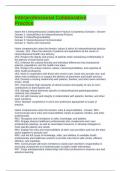Interprofessional Collaborative
Practice
Name the 4 Interprofessional Collaborative Practice Competency Domains - Answer-
Domain 1: Values/Ethics for Interprofessional Practice
Domain 2: Roles/Responsibilities
Domain 3: Interprofessional Communication
Domain 4: Teams and Teamwork
Name competencies under the domain: values & ethics for interprofessional practice
- Answer- VE1. Place the interests of patients and populations at the center of
interprofessional health care delivery.
VE2. Respect the dignity and privacy of patients while maintaining confidentiality in
the delivery of team-based care.
VE3. Embrace the cultural diversity and individual differences that characterize
patients, populations, and the health care team.
VE4. Respect the unique cultures, values, roles/responsibilities, and expertise of
other health professions.
VE5. Work in cooperation with those who receive care, those who provide care, and
others who contribute to or support the delivery of prevention and health services.
VE6. Develop a trusting relationship with patients, families, and other team members
(CIHC, 2010).
VE7. Demonstrate high standards of ethical conduct and quality of care in one's
contributions to team-based care.
VE8. Manage ethical dilemmas specific to interprofessional patient/population
centered care situations.
VE9. Act with honesty and integrity in relationships with patients, families, and other
team members.
VE10. Maintain competence in one's own profession appropriate to scope of
practice.
Name competencies under the domain: roles & responsibilities - Answer- RR1.
Communicate one's roles and responsibilities clearly to patients, families, and other
professionals.
RR2. Recognize one's limitations in skills, knowledge, and abilities.
RR3. Engage diverse healthcare professionals who complement one's own
professional expertise, as well as associated resources, to develop strategies to
meet specific patient care needs.
RR4. Explain the roles and responsibilities of other care providers and how the team
works together to provide care.
RR5. Use the full scope of knowledge, skills, and abilities of available health
professionals and healthcare workers to provide care that is safe, timely, efficient,
effective, and equitable.
RR6. Communicate with team members to clarify each member's responsibility in
executing components of a treatment plan or public health intervention.
RR7. Forge interdependent relationships with other professions to improve care and
advance learning.
, RR8. Engage in continuous professional and interprofessional development to
enhance team performance.
RR9. Use unique and complementary abilities of all members of the team to optimize
patient care
Name competencies under the domain: interprofessional communication - Answer-
CC1. Choose effective communication tools and techniques, including information
systems and communication technologies, to facilitate
discussions and interactions that enhance team function.
CC2. Organize and communicate information with patients, families, and healthcare
team members in a form that is understandable, avoiding discipline-specific
terminology when possible.
CC3. Express one's knowledge and opinions to team members involved in patient
care with confidence, clarity, and respect, working to ensure common understanding
of information and treatment and care decisions.
CC4. Listen actively, and encourage ideas and opinions of other team members.
CC5. Give timely, sensitive, instructive feedback to others about their performance
on the team, responding respectfully as a team member to feedback from others.
CC6. Use respectful language appropriate for a given difficult situation, crucial
conversation, or interprofessional conflict.
CC7. Recognize how one's own uniqueness, including experience level, expertise,
culture, power, and hierarchy within the healthcare team, contributes to effective
communication, conflict resolution, and positive interprofessional working
relationships (University of
Toronto, 2008).
CC8. Communicate consistently the importance of teamwork in patient-centered and
community-focused care.
Name competencies under the domain: teams & teamwork - Answer- TT1. Describe
the process of team development and the roles and practices of effective teams.
TT2. Develop consensus on the ethical principles to guide all aspects of patient care
and team work.
TT3. Engage other health professionals—appropriate to the specific care situation—
in shared patient-centered problem-solving.
TT4. Integrate the knowledge and experience of other professions— appropriate to
the specific care situation—to inform care decisions, while respecting patient and
community values and priorities/preferences for care.
TT5. Apply leadership practices that support collaborative practice and
team effectiveness.
TT6. Engage self and others to constructively manage disagreements about values,
roles, goals, and actions that arise among healthcare professionals and with patients
and families.
TT7. Share accountability with other professions, patients, and communities for
outcomes relevant to prevention and health care.
TT8. Reflect on individual and team performance for individual, as well as team,
performance improvement.
TT9. Use process improvement strategies to increase the effectiveness of
interprofessional teamwork and team-based care.
TT10. Use available evidence to inform effective teamwork and team-based
practices.




